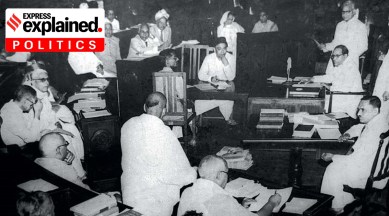The Supreme Court on Thursday gave its answer to the problem, when it ruled that the Chief Election Commissioner (CEC) and the two Election Commissioners (EC) that make up the ECI should be appointed on the advice of a committee comprising the Prime Minister, the Leader of the Opposition in the Lok Sabha and the Chief Justice of India.
In its judgment, the apex court said its arrangement of the committee would remain till Parliament passes a law on the subject.
What were the concerns that Babasaheb expressed?
While discussing the appointment of the Chief Election Commissioner by the President, Dr Ambedkar expressed his apprehensions in the Constituent Assembly on June 16, 1949.
“My provision — I must admit — does not contain anything to provide against nomination of an unfit person to the post of the Chief Election Commissioner or the other Election Commissioner. I do want to confess that this is a very important question and it has given me a great deal of headache and I have no doubt about it that it is going to give this House a great deal of headache,” Babasaheb said.
Giving the example of the United States, where the Senate has some say on certain appointments by the President, Ambedkar noted that the provisions in the American Constitution were a “very salutary check upon the extravagance of the President in making his appointments”. These checks, he said, were likely to lead to “administrative difficulties”.
Story continues below this ad
“The Drafting Committee had paid considerable attention to this question because as I said it is going, to be one of our greatest headaches and as a via media it was thought that if this Assembly would give or enact what is called an Instrument of Instructions to the President and provide therein some machinery which it would be obligatory on the President to consult before making any appointment, I think the difficulties which are felt as resulting from the American Constitution may be obviated and the advantage which is contained therein may be secured,” Ambedkar noted.
He then moved an amendment to include the line that the appointment of the CEC and ECs shall be made by the President “subject to the Provisions of any law made in this behalf by Parliament”.
And how have things played out since?
Over the years, the question of the independence of the ECI from the executive has cropped up several times, given that the persons appointed to the posts have been retired senior bureaucrats.
The UPA-era Second Administrative Reforms Commission in its report in January 2007 recommended that a collegium headed by the Prime Minister and comprising the Lok Sabha Speaker, the Leader of the Opposition in the Lok Sabha, the Law Minister and the Deputy Chairperson of the Rajya Sabha be formed to make recommendations to the President regarding appointments of the CEC and ECs.
Story continues below this ad
“The present procedure of appointment of the Chief Election Commissioner and other Election Commissioners, is laid down in Article 324 of the Constitution and stipulates that they are to be appointed by the President on the advice of the Prime Minister.
During debates in the Constituent Assembly on the procedure for appointment, there were suggestions that the person appointed as the Chief Election Commissioner should enjoy the confidence of all parties and therefore his appointment should be confirmed by a 2/3 majority of both the Houses. Thus even at that stage, there was a view that the procedure for appointment should be a broad based one, above all partisan considerations,” the reforms commission report stated.
Giving the example of the committees for the appointment of the National Human Rights Commission and Central Vigilance Commissioner chairpersons and members, the reforms committee said: “Given the far reaching importance and critical role of the Election Commission in the working of our democracy, it would certainly be appropriate if a similar collegium is constituted for selection of the Chief Election Commissioner and the Election Commissioners.”
What did the BJP say in this matter?
While writing to then-Prime Minister Manmohan Singh on June 2, 2012, then-BJP Parliamentary Party chairman L K Advani cited the reforms committee’s report as well. Advani recommended the formation of a collegium comprising the Prime Minister as chairperson and the Chief Justice of India, the Law Minister and the Leaders of Opposition in the Lok Sabha and Rajya Sabha as members. The BJP was in the opposition then.
Story continues below this ad
“The present system whereby members to the Election Commission are appointed by the President, solely on the advice of the Prime Minister, does not evoke confidence among the people. Keeping these important decisions as the exclusive preserve of the ruling party render the selection process vulnerable to manipulation and partisanship,” the BJP leader wrote, adding that it was time to amend the process.
